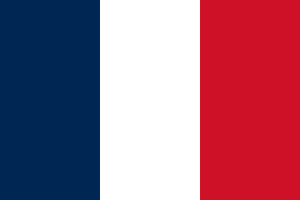Study in France
Introduction
France, known by its high quality of life, is also one of the founding countries of the European Union and a member of the Schengen Agreement. While the usual language of instruction in the majority of offered courses is French, France has become one of the most popular educational destinations in the world for international students from Europe and other regions in the world interested in study abroad programs.
Whether you would like to study in France your bachelor’s (“Licence”), master’s or PhD (“Doctorat”) degree, or enroll in a summer study abroad program, the French educational system is designed to provide students with a wide range of study opportunities. If you would like to receive a more theoretical education, universities might be the most appropriate type of institution for you. Or if you would like to earn your degree in France with a more vocational approach, Grandes Écoles or University Institutes of Technology might be your best choice.

Location: European Union
Population: 66,616,416
Size: 640,679 sq km
Language: French, English
Education System
With the increased autonomy of universities, the massive access of students to university studies and the development of university exchanges in Europe, the higher education system in France have changed considerably over the last decade, drawing it closer to that of other countries. New courses have been devised, accessible at different levels and more open onto the job market; for example, they often include periods of courses and periods of internships in situ.
Compared to other countries, France now receives one of the highest proportions of foreign students in the world: currently over 10 % of the overall student population.
France is one of Europe’s leading countries with regard to the number of international students studying there, with a current figure of over 240,000 students. Thanks to the flexibility of the French higher education system, an itinerary tailored to suit each individual can be established from initial university studies to the most advanced specialization programs.
These levels of study include various “parcours” or paths based on UE (Unités d’Enseignement or Modules), each worth a defined number of European credits (ECTS). A student accumulates these credits which are generally transferable between paths. A Licence is awarded once 180 ECTS have been obtained. A Master is awarded once 120 additional credits have been obtained.
Higher education in France is divided between grandes écoles and universities.
Higher education in France is organized in three levels or grades which correspond to those of other European countries, facilitating international mobility:
- Bachelor
- Master
- Doctrate
Why France:
Key advantages of studying in France
| World’s THIRD leading host country for higher education | |
| Developed economy | |
| Quality education | |
| Paid internship opportunity with top European multinationals | |
| Low fees | |
| IELTS and TOEFL score not mandatory | |
| Accommodation helps by French government up to 40% to 50% | |
| Free French language coaching* | |
| 2 years PSW (Post study work) permit and Opportunity for PR | |
| European Union Visa |
Language requirement to study in France?
Although the expected level of command of English may vary depending on the school and, above all, the study program or course, the usual average English language requirement you will be required to have to study in Europe is 550 points (paper-based TOEFL test), or 213 points (computer-based TOEFL test), or 79-80 points (Internet-based TOEFL test), or 5.5 – 6.5 score in the IELTS test.
A beautiful language, a beautiful country and a wonderful culture.
Not only French is regarded as the sweetest language of the world, France also has a very vibrant student culture. France is widely regarded for it’s great architectures, sophisticated culture and great values. Paris, the love capital of the world is also the most visited / touristic city of the world.
Climate:
A lot of variety, but temperate. Cool winters and mild summers on most of the territory, and especially in Paris. Mild winters and hot summers along the Mediterranean and in the south west. Mild winters and cool summers in the North West (Brittany). Cool to cold winters and hot summer along the German border (Alsace).
Culture:
France is considered to be the cultural capital of the world. The culture of France is diverse, reflecting regional differences as well as the influence of recent immigration. France has played an important worldwide role for centuries as a cultural center, with Paris as a world center of high culture. France is noted for its cosmopolitan, civilized approach to life, combined with great concern for style, fashion and appearances.
Transport:
The railway network in France is the most extensive in Europe. Rail connections to all other neighboring countries in Europe have been developed. Intra-urban connections are also well developed with both underground services and tramway services complementing bus services and extensive roadways.
A safe country, safe for women and no violence against ethnic minorities.
France is a safe country. It’s safe for women, you can return from a friend’s place post midnight taking public transport without bothering about your safety in 99% of the country. You can also dress comfortably here, there won’t be those annoying stares and glares.
Besides, and more importantly, there is no physical violence in this country against ethnic minorities. Your parents won’t have to worry about your safety, unlike some other western countries where Indians are not safe now a day.
Program offers in Diploma Bachelor & Masters Program.
- Business, Finance, Management, Administration
- Entrepreneurship, Human Resource Management, Marketing
- Economics, Effective Communication Design Management
- International Relations, e-Business, Sports Management
- European Management, Credit Control & Debt Management
- Tourism and Hospitality Management, Fashion Management
- Global Banking & Financial Markets
FAQ's
Is French Language compulsory in France?
May I work in France?
What Visa status will I have as a student?
How can I accommodate myself in France?
Will I get post study work permit?
Request More Information
Topnotch offers exciting, unrivalled services. For information on our various services, contact our Counselor on phone nos. +91-8121212105, 888533 1212 / 1313 / 1414, 814355 1515 / 1616 / 1717 / 1818 / 1919, 9111 472 572 ,on all working days between 10 AM and 8 PM (IST). or, email us at md@topnotchoverseas.com with your full details, for more information.

